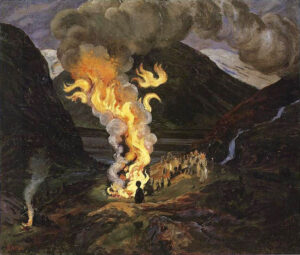Mussorgsky: Night on Bald Mountain
Some people like to associate the tone poem Night on Bald Mountain with Halloween. I could have featured this work in late October to coincide with that occasion, but I think that would only confuse things. Mussorgsky originally titled the work St. John’s Night on the Bare Mountain. The Feast of St. John the Baptist occurs in June because the Gospel of Luke notes that John was born about 6 months before Jesus. So much for October.

There are pagan legends associated with St. John’s Eve that have to do with water and fertility. A fern is said to blossom on this one night. But in Slavic legend, the fern flower is guarded by evil spirits. The Russian writer Nikolai Gogol’s tale “St. John’s Eve” rivals any horror Edgar Allen Poe could dream up. And Gogol’s tale is said to have inspired Mussorgsky’s tone poem.
We have noted in former posts how a nationalist movement in music often turns to folklore. Mussorgsky was one of the Mighty Five who sought an authentic Russian sound. The tone poem, pioneered by Franz Liszt, was just coming into vogue, and Night on Bald Mountain was one of the first by a Russian composer. Mussorgsky finished it on St. John’s Eve in 1867.
But Night on Bald Mountain was never performed in Mussorgsky lifetime. Its first performance came after Rimsky-Korsakov reworked the composition substantially in 1886, and it is Rimsky’s version that is most often performed now. Leopold Stokowski created a third version for the Disney film Fantasia (1941). The performance featured here is Rimsky-Korsakov’s version.



